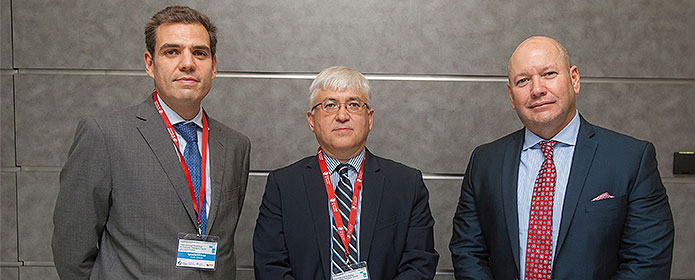"The identification of molecular alterations now makes it possible to administer personalized therapies for different types of cancer."
Dr. Hilario Mata, director of Global Programs at MD Anderson Cancer Center Houston (USA), said that precision medicine is already a reality thanks to the combination of basic and clinical research .

"The identification of molecular alterations makes it possible to administer personalized therapies for different types of cancer", said Dr. Hilario Mata, director Global Programs at MD Anderson Cancer Center Houston (USA), during the 1st International Workshop on Genomic Testing in Cancer, held Sept. 28-30 at the research center Applied Medicine (CIMA) of the University of Navarra. Nearly 200 specialists from all over the world met in Pamplona to participate in this international meeting organized by the University of Navarra. Clínica Universidad de Navarra MD Anderson Cancer Center Houston (USA), the CIMA and the high school de research Sanitaria de Navarra (IDISNA).
One of the most important advances in the approach to cancer patients has been the development of genetic diagnostic techniques. According to the expert, "a few years ago we used to find patients with the same cancer who responded differently to the same treatment. During the last decade we have witnessed a technological revolution and we can now evaluate the conformation Genetics of an individual and decide whether a drug will be effective in different types of cancer, as is the case with breast tumors. This saves a lot of time, reduces costs and can save more lives. Precision medicine is already a reality thanks to the combination of basic and clinical research , a strategy that has enabled the launch of multiple clinical trials around the world with a single goal: the benefit of the patient".
One of the examples in which targeted therapy has become established in the clinical internship is lung cancer. According to Dr. Ignacio Wistuba, director of department of Translational Molecular Pathology at MD Anderson Cancer Center Houston (USA) and co-organizer of meeting, "molecular diagnosis of lung cancer is now part of routine care. In addition to the histological diagnosis of the tumor subject by means of a tissue biopsy, the pathologist preserves material for the diagnosis of genetic mutations. In this way, it can be determined whether a therapy available is useful for a given patient. In addition, because molecular mechanisms of resistance to such therapies have been discovered, in many cases a new biopsy is necessary after treatment."
In this sense, notes Dr. Ignacio Gil-Bazo, director of the department of Medical Oncology of the Clínica Universidad de Navarra, researcher of the CIMA and co-organizer of the congress, "in the coming years we will witness the routine use of liquid biopsies, which study these same genetic alterations in patients by means of a peripheral blood analysis, that is, without performing an invasive biopsy".
ImmunotherapyWithin these precision medicine strategies, the researchers agreed that immunotherapy is changing the paradigm of how to cure cancer. "It consists of educating the immune system to identify those cells that are malignant and to eliminate and destroy them. The results have been particularly striking in patients with lung cancer and melanoma. But in the future it is likely to be applied to other types of tumors," said the researchers at MD Anderson Cancer Center Houston.
At present, there are numerous international programs of study on immunotherapy. Specifically, research teams from Clínica Universidad de Navarra and CIMA have 25 clinical trials underway for the treatment of different oncological pathologies. The main ones are metastatic melanoma and lung cancer, as well as bladder, kidney, head and neck, liver, stomach and cervical cancer, among others.
PreventionA significant percentage of cancer diagnoses are caused by environmental factors, such as smoking, per diem expenses or excessive sun exposure exhibition . According to Dr. Mata, "in these cases, prevention is the best tool to deal with this disease. Early diagnosis is essential to improve patient survival. But the most important social achievement in the cure of cancer will come when we manage to make new generations aware that healthy habits such as physical exercise, a varied per diem expenses and quitting smoking can help prevent cancer".
